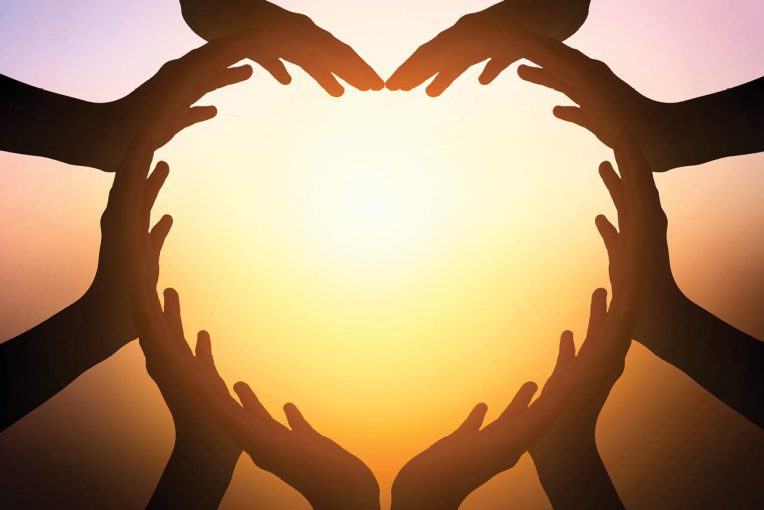Whether it’s a quick trip down the street to volunteer at Midwest Food Bank to combat local food insecurity or a drive up Interstate 55 to a sprawling Chicago warehouse to package medical supplies for shipment to Ukraine, a newly established registered student organization (RSO) lives up to the name of its parent organization by regularly leaving the borders of Illinois State University’s campus to deliver humanitarian aid.
Friends of Doctors Without Borders (FDWB) is an RSO that is equal parts education and action. With a membership of around 70 students, FDWB represents a group of students committed to global health. It meets every other week in Schroeder Hall to discuss current issues, host guest speakers, and plan service efforts that align with Doctors Without Borders’ mission to “provide independent, impartial medical humanitarian assistance to the people who need it most.”
“We talk about things and try to connect our meetings to what’s going on in the world,” said John Munn IV, a senior pre-med student from Normal and current FDWB president. “We’ve spent time talking about mental health, and the different awareness months, and a lot of health-related topics, too.”
The RSO was founded in the fall of 2022 by students Emily Drew and Delaney Reynolds, who first approached Jeff Helms ’00, Ph.D. ’10, a pre-health professions advisor and instructional assistant professor in the School of Biological Sciences, and Kate Weiser, a pre-health coordinator in University College, to establish the new group. Helms served as the founding advisor to the RSO.
“The big thing for Kate and me was that if you’re going to start a new RSO, it has to be more than just something to put on an application that you do your senior year and then leave it. They had to have a plan,” Helms said. “When we sat down, Emily and Delaney had a really good plan with a strategy for bringing people in and getting participation as well as a succession plan for when they would hand it off.”
Munn learned of the RSO when another student group he is involved in, the Pre-Health Society, held a joint meeting with FDWB.
“I just thought that it was something I wanted to get involved with, something I wanted to do,” recalled Munn, who first served in FDWB as fundraising coordinator before becoming president. “I thought it would be a good way to help and a good way to get involved.”
—Jeff Helms
“We have a great student population that understands that there’s more to the world than just what happens here, and this is an organization set up to take action that really understands that.”
FDWB has hosted film screenings, sponsored blood drives, visited retirement homes, and coordinated fundraising events. Munn said volunteering with Project C.U.R.E. Chicago, packaging medical supplies to be sent to Ukraine, was the most fulfilling volunteer work he’s ever done.
“Whenever we’re out volunteering, we always have a good time because we’re doing something positive and helping people out,” he said. “I’ve always tried to be someone who helps when they can and doing that kind of thing just makes you feel good. It makes you feel good about your impact on the world.”
Dr. Alicia Wodika, an associate professor in the Department of Health Sciences, took over as FDWB’s advisor in August. She previously had Munn in her Global Health class and found him to be an engaging student. She found more like him in FDWB.
“They’re an enthusiastic group of students who really want to make an impact both locally and globally,” she said. “They want to go beyond the things they’re learning in the classroom or through other extracurriculars and make a difference.”
Wodika said the work of FDWB is commendable, especially given the heavy topics and issues the RSO addresses.
“When you think about Doctors Without Borders and all the work they’re doing around the world, it can be a lot. Global health can be a challenging topic to even begin to think about where and how we can make an impact,” she said. “I think it speaks loudly that this group of students was not only willing, but eager to get involved. There’s a hopeful aspect to their work and with their desire to make a difference.”
“Having a group of young adults pondering these topics is a good thing.”
FDWB hopes to grow its membership and expand its efforts. It’s open to all students—not just those pursuing degrees and careers in health-related fields. “We just want anyone who’s wanting to make a difference,” Munn said.
The group provides an increasing number of opportunities for students to consider and offer humanitarian aid to people beyond the borders of their campus and their community.
“We have so many organizations on this campus that are really, truly working to make global change,” said Helms. “We have a great student population that understands that there’s more to the world than just what happens here, and this is an organization set up to take action that really understands that.”

